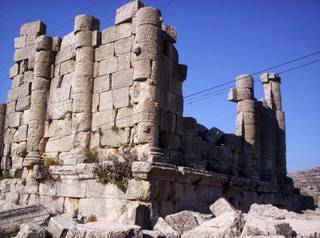Polygonal masonry
This article needs additional citations for verification. (July 2014) |
You can help expand this article with text translated from the corresponding article in Italian. (October 2014) Click [show] for important translation instructions.
|
Polygonal masonry is a technique of stone wall construction. True polygonal masonry is a technique wherein the visible surfaces of the stones are dressed with straight sides or joints, giving the block the appearance of a polygon.[1]
This technique is found throughout the world and sometimes corresponds to the less technical category of Cyclopean masonry.[2]
Places
[edit]Albania
[edit]And others
Crimea
[edit]Easter Island
[edit]
Ecuador
[edit]Finland
[edit]
Georgia
[edit]Greece
[edit]
Hungary
[edit]India
[edit]Indonesia
[edit]Iran
[edit]Italy
[edit]
In Italy, polygonal masonry is particularly indicative of the region of Latium, but it occurs also in Etruria, Lucania, Samnium, and Umbria; scholars including Giuseppe Lugli have carried out studies of the technique.[3][4] Some notable sites that have fortification walls built in this technique include Norba, Signia, Alatri, Boiano, Circeo, Cosa, Alba Fucens, Palestrina, and Terracina.[5] The Porta Rosa of the ancient city of Velia employs a variant of the technique known as Lesbian masonry.[1]
Japan
[edit]
- Akō Castle
- Fushimi Castle
- Goryōkaku
- Nakagusuku Castle
- Nijō Castle
- Odawara Castle
- Oka Castle
- Osaka Castle
- Shibata Castle
- Shuri Castle
- Uwajima Castle
Latvia
[edit]
Malta
[edit]Mexico
[edit]Montenegro
[edit]
Morocco
[edit]Peru
[edit]

- Ollantaytambo
- Raqch'i
- Saksaywaman
- Tambomachay
- Tarawasi
- Usnu
- Vilcabamba
- Vilcashuamán
- Wanuku Pampa
- Twelve-angled_stone
Philippines
[edit]Portugal
[edit]Romania
[edit]
Russia
[edit]
Spain
[edit]Sudan
[edit]Sweden
[edit]Syria
[edit]

- Benastur Monastery
- Church of Saint Simeon Stylites
- Churches of Sheikh Suleiman village
- Cyrrhus
- Dana
- Deir Qeita
- Jarada
- Kharab Shams Basilica
- Mount Simeon
- Mushabbak Basilica
- Refade
- Serjilla

Thailand
[edit]Turkey
[edit]
United Arab Emirates
[edit]United Kingdom
[edit]United States
[edit]
References
[edit]- ^ a b G.R.H. Wright (23 November 2009). Ancient Building Technology, Volume 3: Construction (2 Vols). BRILL. pp. 154–. ISBN 90-04-17745-0.
- ^ Carmelo G. Malacrino (2010). Constructing the Ancient World: Architectural Techniques of the Greeks and Romans. Getty Publications. pp. 97–. ISBN 978-1-60606-016-2.
- ^ Frank, T. 1924. "Roman buildings of the Republic: an attempt to date them from their materials." MAAR 3.
- ^ Giuseppe Lugli (1957). La Tecnica Edilizia Romana Con Particolare Riguardo a Roma E Lazio: Testo. 1. Johnson Reprint.
- ^ Jeffrey Alan Becker (2007). The Building Blocks of Empire: Civic Architecture, Central Italy, and the Roman Middle Republic. ProQuest. pp. 109–. ISBN 978-0-549-55847-7.
- P. Gros. 1996. L'architecture romaine: du début du IIIe siècle av. J.-C. à la fin du Haut-Empire. 2 v. Paris: Picard.